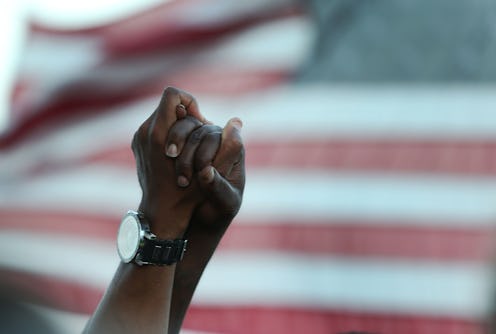Mass shootings are frequently attributed to mental illness. As a result, after the shooting in Charleston that left nine black parishioners dead, anti-racism activists took to Twitter as a precautionary measure, calling for others to recognize that the attack was rooted in racism rather than attributing it to the umbrella term of "mental illness." In the days following the Charleston shooting, a racist manifesto linked to the shooter was uncovered, filled with white supremacist statements that make it clear — if it wasn't already — that this overwhelmingly seems to be a hate crime. But why do we have to work so hard to convince one another of this?
For starters, it's not the first time the term "mental illness" has been used to explain mass shootings. Last May, Elliot Rodger killed six people in Isla Vista, near the UC Santa Barbara campus, before taking his own life. Soon afterward, his extremely sexist manifesto came to light, which elaborated on his desire for retribution against women. The manifesto made it clear that Rodger wanted to act on his misogyny and did so, but much of the subsequent conversation focused solely on mental illness. Even before this, following a 2012 massacre at Sandy Hook Elementary School in Newtown, CNN claimed that gunman Adam Lanza could have carried out the attack in part due to inadequate mental health resources.
It is important that we have a conversation about mental health in the public sphere. But restricting these conversations to the aftermath of tragedies like those in Isla Vista, Newtown, and Charleston does not provide room for much nuance. Instead, we must choose to have these conversations consistently, rather than treating people as statistics and tragedies as the only possible conversation starters.
If we want to have a productive conversation about mental health, we must be compassionate and open-minded, and we must also recognize that "mental illness" is an umbrella term that does little to help us do either of these things. There are many different types of mental illness, and any particular type of mental illness manifests itself differently in differently individuals.
Even the best of intentions lead us into ableist territory when we talk about mental health. Firstly, attributing mass shootings by white male perpetrators specifically to mental illness — in a way that generally isn't done when talking about people of color — makes it seem as though mental illness is solely responsible for white crime, which is not only insensitive but also evades all possible nuance in discussions about mental health. Following an attack on Parisian satirical newspaper Charlie Hebdo in January, The New York Times described the incident as a "terrorist attack" that came at a time when "Islamic radicalism" was becoming a European security concern. And then, when two men attacked a "Draw Muhammad" contest in Garland, Texas, NBC reported on attempts to connect the suspects to terror groups. All of these perpetrators of color aren't described as "quiet" or "shy" or "off track," as a recent Washington Post article described Roof. Nor are their attacks seen as isolated incidents brought on by mental illness; instead, all Muslims are asked to apologize for incidents they had nothing to do with.
Secondly, even the pushback can be problematic; structural racism is still prevalent, but racism is not a mental illness. It is something that is learned and is able to exist because it is embedded within powerful institutions. The Confederate flag, a symbol of racial oppression and suppression, still flies in South Carolina; racism is unfortunately still alive and well. So claims like the tweet below, while well-intentioned, do not accurately capture how systemic oppression is ingrained in the fabric of our communities, and they further stigmatize mental illness.
Finally, using the blanket term "mental illness" to explain tragedies also stigmatizes mental illness. We must educate ourselves about mental health; there is no question about that. But this education is difficult work. It means not making assumptions about how mental illness does or does not manifest itself in a specific individual. It means understanding that just because you can't see mental illness doesn't mean it is not real, or is not taking its toll. It means that we must keep showing up to these conversations with the acknowledgement that everyone is coming to the table with a different, nuanced perspective.
We must push ourselves to dig deeper than surface level-speculation, and we must consider the impact language has in these conversations. Some perpetrators of mass shootings do have mental illnesses, but so do many people dedicated to social justice — myself included — and so do many other folks. Mental illness is not evil and it does not explain all mass shootings, just as an entire religion cannot be considered responsible for acts of violence.
In discussing mental health, we must engage with the nuanced perspectives of those around us, and recognize that just because their lived experiences are different from our own doesn't make them any less valid or significant. Our discussions must also be intersectional; we must be cognizant of how conversations about mental health might play out differently across lines of difference.
If you're curious about this particular talking point, considering consulting resources like Everyday Feminism and Black Girl Dangerous, which are working to bring intersectionality to these conversations. Above all, we must come to these conversations from a place of love and compassion; if we do that, we might finally be able to challenge and eventually eliminate the continued stigmatization of mental illness.
